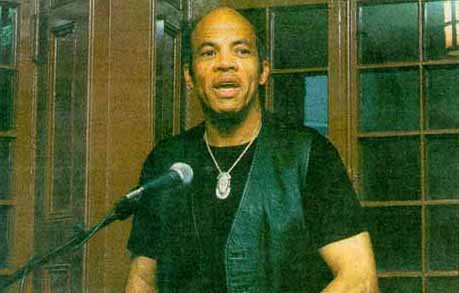Esteemed author talks on race
The Daily Pennsylvanian
April 25, 2000
Last night at the Kelly Writers House, acclaimed author John Edgar Wideman discussed his philosophies on literature and race before a standing room-only crowd comprised of about 90 students, faculty members and Philadelphia residents.
Wideman is the third and final Writers House Fellow of the year. The program also brought Grace Paley and Robert Creeley to campus earlier this semester. His reading was co-sponsored by the Art Sanctuary -- a community arts program which celebrates African-American culture -- the Urban Arts Project and Writers House.
Wideman, a 1963 College graduate who taught English at Penn in the 1970s is a past recipient of the Rhodes and Thouron graduate fellowships. He is also the only person to have won the Penn/Faulkner Award twice.
In an attempt to keep the audience on its toes, Wideman read a not-yet-published short story entitled, Sharing. The story is a dialogue written in the voice of a white middle-aged suburban woman who is talking to her African-American middle-aged neighbor who had come to her door to borrow some mayonnaise.
The author explained that this work forced him to adopt a persona of a character who was quite different from himself.
"Seeing myself through her eyes. That was a real challenge, a challenge of voice, a challenge of sensibility," he said.
Like this story, many of his literary works -- like Brothers and Keepers, Philadelphia Fire and his new release, Two Cities -- deal with race, a topic he believes should be addressed more substantially in society.
"Our problem is that we are still dealing with an 18th century concept that has been quickly debunked," he said. "That idea of race was an invention with very specific purposes -- to justify oppression."
The best form in which people can challenge racial assumptions, according to Wideman, is through writing imaginative literature.
"I believe in literature," he said, noting that one must be willing to risk failure when creating.
"I don't write books because I have answers. I write books because I have questions. What we are is the questions that we ask, not the answers that we provide," he explained. "It's all about that process of self-examination. I think that's what the best writing always contains."
Not only did Wideman discuss changing common perceptions of race in today's society, he also pointed to the importance of cultural heritage.
"Culture is real. There is an African-American culture that is very distinct and is very concrete, and I see myself as an inheritor of that culture. What I'm fussing about is the essentialism of race and the division of people into kinds," he said.
Several members of Penn's English Department offered effusive praise of the author.
Writers House Faculty Director Al Filreis said he believed Wideman's last novel is "among the few great books by an American. Finer and greater than anything Faulkner wrote."
"He's really one of our most important writers," added English Professor Herman Beavers, who is also the director of the Afro-American Studies Program. Referring to the story that Wideman read earlier in the evening, Beavers said, "It's not about whether or not we can share a jar of mayonnaise. The story really is about the walls that we build up to keep us from asking questions."
Most of the audience appeared to be longtime fans of Wideman's work. Many commended him for the political activism that has complemented his literary work.
Most notably, Wideman wrote the introduction to a literary anthology called In Defense of Mumia.
"The stance that he's taken on Mumia, as a writer and an academic, is really good," said Theodore Harris, a visual artist in Philadelphia. "We need those types of people working in that system to talk about what's going on with injustice."

